
Cochabamba is a city and municipality in central Bolivia in a valley in the Andes mountain range. It is the capital of the Cochabamba Department and the fourth largest city in Bolivia, with a population of 630,587 according to the 2012 Bolivian census. Its name is from a compound of the Quechua words qucha "lake" and pampa, "open plain." Residents of the city and the surrounding areas are commonly referred to as cochalas or, more formally, cochabambinos.
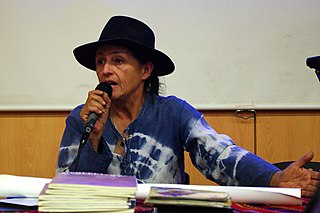
Silvia Rivera Cusicanqui is a Bolivian feminist, sociologist, historian, and subaltern theorist. She is Emeritus Professor at the Universidad Mayor de San Andrés in La Paz, Bolivia, where she taught Sociology for over thirty years. She draws upon anarchist theory as well as Quechua and Aymara cosmologies. She is a former director and longtime member of the Taller de Historia Oral Andina. The Taller de Historia Oral Andina has conducted an ongoing critique of Western epistemologies through writings and activism for nearly two decades. She is also an activist who works directly with indigenous movements in Bolivia, such as the Katarista movement and the coca growers movement.
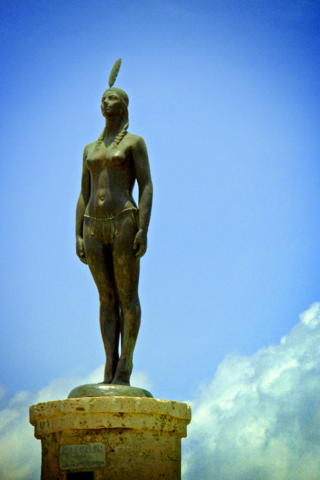
India Catalina was an indigenous child of Mokaná ethnicity from the Colombian Atlantic coast, who was kidnapped by Pedro de Heredia to be an interpreter and intermediary, playing a role in the Spanish conquest of Colombia.
Patacamaya or Patak Amaya (Aymara) is a city in Bolivia, situated in the La Paz Department. It is the seat of the Patacamaya Municipality, the fifth municipal section of the Aroma Province. Patacamaya lies in the Altiplano, approximately 100 km southeast of La Paz. It contains the intersection between 'Carretera 1' which goes from La Paz to Oruro, as well as Cochabamba, and the 'Carretera Arica-La Paz'. The 'Tambo Quemado' highway is one of the most important international roads that travels through Bolivia.
Botrychium onondagense is a species of fern in the family Ophioglossaceae that is closely related to the more common Botrychium lunaria. It is known from many locations in the temperate areas of the Northern Hemisphere including Europe, Russia, Canada, and the United States. It was first described in 1903, but has long been regarded as a synonym for Botrychium lunaria.

Elsa Cladera de Bravo. (1922–2005) was a Bolivian trade union leader and educator, leader of the teachers organisation in Bolivia, delegate at the "Asamblea del Pueblo" in 1971, engaged in the work for women's emancipation
Prunus rigida, is a species of shrub or tree in the family Rosaceae. It is native to Peru and Bolivia.
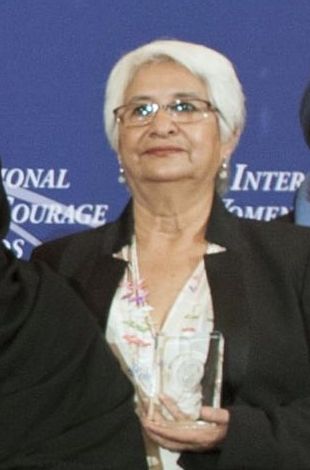
Rosa Julieta Montaño Salvatierra is a Bolivian attorney, human rights defender, woman's rights activist, feminist writer and a 2015 winner of the US State Department's International Women of Courage Award.
Kathrin Barboza Márquez is a Bolivian biologist who is an expert in bat research. In 2006, she and a research partner discovered a species thought to be extinct and in 2010, she was awarded the National Geographic's "Young Explorer Grant". She became the first Bolivian scientist to win a L'Oréal-UNESCO Fellowship for Women in Science in 2012 and in 2013 was named by the BBC as one of the top ten Latin American women of science.
Sonia Alconini Mujica is a Bolivian anthropologist and archaeologist specializing in the socioeconomic and political development of early states and empires in the Andes. She has studied the dynamics of ancient imperial frontiers, and the ways in which Guarani tropical tribes expanded over these spaces. She has also conducted work in the eastern Bolivian valleys and Lake Titicaca region.
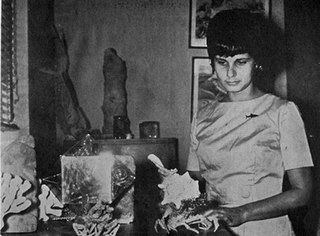
Idelisa Bonnelly de Calventi was a Dominican marine biologist who is considered the "mother of marine conservation in the Caribbean". She was the founder of the study of biology in the Dominican Republic, as well as the founder of the Institute of Marine Biology and the Dominican Foundation for Marine Research. She was instrumental in the creation of the first Humpback Whale Sanctuary of the North Atlantic and has won numerous awards, including induction into the UNEP's Global 500 Roll of Honour, UNESCO's Marie Curie Medal and the Order of Merit of Duarte, Sánchez and Mella. The BBC has called her one of the most important women scientists in Latin America.

Elsa Nadezhda Bravo Cladera is a Bolivian linguist, researcher and writer. She is a Doctor of Philosophy in Romance Languages from the University of Uppsala. She is "Académica de número" of the Academia Boliviana de la Lengua.

Fernando Huanacuni Mamani is a Bolivian politician, lawyer and researcher. He served as the Foreign Minister of Bolivia from 2017 to 2018.

Marfa Inofuentes Pérez (1969–2015) was an Afro-Bolivian activist involved in the Constitutional reform movement to recognize black Bolivians as an ethnic minority in the country. After achieving the goal for Afro-Bolivians to be protected under the law, she served as the head the Ministry of Gender and was appointed deputy mayor of the Peripheral Macrodistrict of the Municipality of La Paz.

Jeanine Áñez Chávez is a Bolivian lawyer, politician, and television presenter who served as the 66th president of Bolivia from 2019 to 2020. A former member of the Social Democratic Movement, she previously served two terms as senator for Beni from 2015 to 2019 on behalf of the Democratic Unity coalition and from 2010 to 2014 on behalf of the National Convergence alliance. During this time, she served as second vice president of the Senate from 2015 to 2016 and in 2019 and, briefly, was president of the Senate, also in 2019. Before that, she served as a uninominal member of the Constituent Assembly from Beni, representing circumscription 61 from 2006 to 2007 on behalf of the Social Democratic Power alliance.
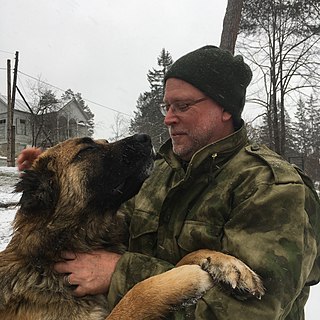
Rainer W. Bussmann is a German botanist and vegetation ecologist, specializing in ethnobotany and ethnobiology, wild food plants, wild crop relatives, climate change, gastronomic botany and preservation of traditional knowledge in the Andes, the Caucasus and the Himalayas. He has worked at the University of Bayreuth, University of Hawaii, University of Texas, the Missouri Botanical Garden, Ilia State University and the State Museum of Natural History Karlsruhe; he has founded several international non-governmental organizations, including Nature and Culture International, Saving Knowledge, and Ethnomont.
Dora Justiniano de la Rocha (1925-2016), full name Dora Justiniano Callau de la Rocha, was a linguist, educator, and poet from the Beni department of Bolivia.
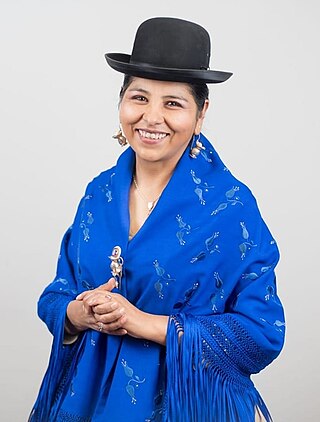
Bertha Beatriz Acarapi is a Bolivian politician and former television presenter serving as a party-list member of the Chamber of Deputies from La Paz since 2020. A member of the Movement for Socialism, she previously served as an El Alto municipal councillor from 2000 to 2004 on behalf of the Revolutionary Left Movement and from 2004 to 2010 on behalf of Plan Progress for Bolivia. During her second term, she served as president of the El Alto Municipal Council from 2006 to 2007, becoming the first woman to assume that post. Outside of politics, Acarapi's lengthy career in radio and television journalism led her to join ATB in 2015, becoming one of the country's first high-profile chola indigenous presenters.

Romina Guadalupe Pérez Ramos is a Bolivian academic, diplomat, politician, and sociologist who served as ambassador of Bolivia to Iran from 2019 to 2020 and since 2021. A member of the Movement for Socialism, she previously served as a party-list member of the Chamber of Deputies from Cochabamba from 2015 to 2019. Pérez graduated as a sociologist from the Higher University of San Simón before completing postgraduate studies in the European Union. She comes from a generation of leftist academics who entered political activity as activists against the military dictatorships of the 1970s and 80s, as well as the neoliberal democratic governments that succeeded them. Her work in the field of women's and ethnic rights led her to join multiple NGOs, including the Center for Legal Studies and Social Research, through which many academics and intellectuals became politically linked with the Movement for Socialism. In 2014, she won a seat in the Chamber of Deputies on the party's electoral list but did not complete her term, being appointed ambassador to Iran in mid-2019.

Lidia Patty Mullisaca is a Bolivian politician and trade unionist. A member of the Movement for Socialism, Patty represented La Paz in the Chamber of Deputies, first as a substitute alongside Manuel Canelas from 2015 to 2018 and later as a voting member until 2020. She later served as consul of Bolivia to Puno, Peru, in June 2023 and has been vice consul of Bolivia in La Plata, Argentina, since September 2023.
















